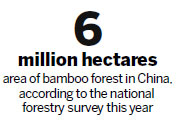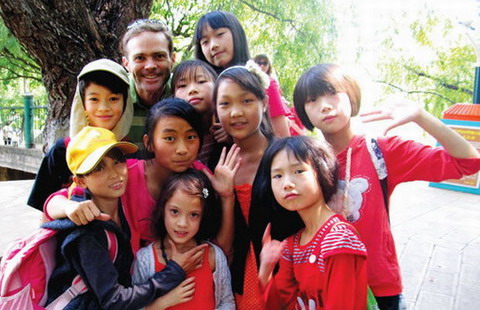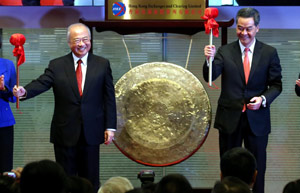Versatile bamboo attracts increasing global attention
Updated: 2014-11-25 07:43
By Gao Bo(China Daily USA)
|
|||||||||
Bamboo's potential in the energy, construction and textile sectors is attracting increased global interest, and China - the world's largest source and processing leader - is well-positioned to take advantage of the versatile plant's growing popularity, a leading specialist told an international forum on Wednesday.
China has more than 6 million hectares of bamboo forest, according to the national forestry survey conducted this year. This represents an 11 percent increase on the previous survey carried out in 2008.
In terms of export value, bamboo products from China hit nearly $1.9 billion in 2012 and the domestic market in China reached $19.5 billion, said Hans Friederich, director general of the International Network for Bamboo and Rattan, at an international seminar on the Green Growth and Innovation-Driven Bamboo Industry in Huangshan city, Anhui province.
INBAR, established in 1997, is an intergovernmental organization dedicated to improving the livelihoods of rural producers within the context of a sustainable natural environment.
Friederich focused on three aspects - energy, building materials and textiles - in which bamboo can be used innovatively, expanding on its more traditional uses such as chopsticks and furniture.
"Bamboo charcoal is cleaner than charcoal from some trees. It burns with less smoke and yet it has very similar calorific values," he said, adding that such programs have been established in Ethiopia, Ghana and India.

As the country with the most bamboo species, China leads the world in terms of planting area, varieties and export volume, said Zhang Yongli, deputy director of the State Forestry Administration, at the opening ceremony of the forum.
In terms of processing and innovation capabilities, China is also a world leader, and this is driving the booming development in main production areas, Zhang said.
The national production value of the bamboo industry was 167 billion yuan ($27.2 billion) in 2013, 36 percent more than for 2012.
The members of INBAR initially used bamboo for forestation, and only some members have the capability of advanced processing, said Wu Junqi, senior program officer at INBAR.
The South American country of Suriname discovered the green benefits of bamboo, its ambassador to China said.
Mineral exploration and exploitation damaged the environment, but planting bamboo allowed the forest to quickly recover, and local income levels will be boosted as production skills and expertise from China are put in place, Ambassador Lloyd Lucien Pinas said.
Wu said that bamboo has a relatively rapid life span, normally about eight years for each plant. But new buds appear at the end of a year, and this allows growers to replenish stocks.
"Therefore, planters need not invest too much at the beginning and they can keep harvesting for years as long as the forest is managed well."
Nepal, too, discovered the plant's environmental advantages and its decision to join INBAR is recognition of the fact that bamboo combats climate change, restores degraded landscapes and brings new income opportunities to rural communities, said Mahesh K. Maskey, Nepal's ambassador to China.
In Nepal, about 12 general and 50 species of bamboo have been planted in 73 of 75 districts, covering an area of 63,000 hectares.
gaobo@chinadaily.com.cn
(China Daily USA 11/25/2014 page5)
- SAT scores canceled for some test-takers in China, Korea
- India plans high-speed rail project with China
- S. Korea to test-transport Russian coal import via DPRK port
- Dozens take refuge from Japan quake aftershocks
- S. Korea holds drill in islets disputed with Japan
- Yingluck mulls over returning to politics

 Ferguson grand jury has reached decision
Ferguson grand jury has reached decision
 Top 7 affects of rate cut on people's life
Top 7 affects of rate cut on people's life
 42nd International Emmy Awards held in New York
42nd International Emmy Awards held in New York
 Forbidden City more welcoming
Forbidden City more welcoming
 Olympic champ Sun Yang failed doping test in May
Olympic champ Sun Yang failed doping test in May
 Top 10 kinds of foreigners in China
Top 10 kinds of foreigners in China
 Trending: Hangzhou man licks out painting
Trending: Hangzhou man licks out painting
 Rio 2016 mascots combine Brazilian fauna, flora
Rio 2016 mascots combine Brazilian fauna, flora
Most Viewed
Editor's Picks

|

|

|

|

|

|
Today's Top News
Breast cancer study receives $1.5 million grant
SAT scores canceled for some test-takers in China, Korea
Wealthy want kids to study abroad
Hagel resigning as American defense secretary
Growth in telemedicine expected with aging population
Nation to top green list by 2030
SAT scores canceled for some test-takers in China, Korea
Country enhances security checks for govt websites
US Weekly

|

|








